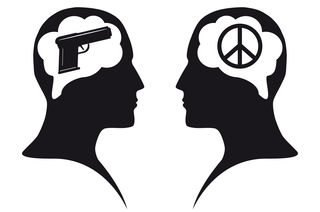Psychiatry
Why Psychiatric Drugs Don't Cause Mass Shootings
The NRA theory that drugs cause mass shootings simply doesn't make sense.
Posted May 21, 2018 Reviewed by Ekua Hagan

My nephew is 16 and an avid gun enthusiast. Over the past few years, I’ve learned more about gun rights and ownership than I ever thought possible. He is also the nephew of a woman with severe mental illness (myself) who raised him to think about the brain. Because of this, he has a nuanced view of gun ownership and responsibility, and so do I.
The current theory from the NRA that drugs are responsible for school shootings ranks right up there with blaming death from pneumonia on the use of antibiotics. Life is not this simple.
In the United States, we treat psychiatric illnesses with psychotropic drugs. I don’t support this policy as a first line response to mental illness, but this is our reality.
Most would agree that the majority of mass or spree killers have something wrong in their brains. Using typical syllogistic logic, if mental health disorders and behaviors that lead to mass and spree killings are regularly treated with psychotropic drugs in the U.S., it makes sense that those who commit the crimes will be on psychotropic drugs. It’s not a chicken-or-the-egg problem. There is the mental health concern and then there are drugs as a response—not a cause. The NRA and other gun rights lobby groups are conveniently skipping the most important part of the problem: the shooters are on drugs because there were signs that something was not right in their brains from the beginning.
Former FBI profiler and agent John Douglas, the author of Mindhunter, has this to say about school shootings:
"A badly adjusted child, motivated by anger and resentment, may see this act as the logical and dramatic solution to his own problems. He won’t think about the horrible aftermath, the fact that his family will be devastated and he will spend years in confinement, destroying his own life. In fact, depending on his age and psychological makeup, he may not even think beyond the act itself. Just as the skyjackings of the 1960s and 1970s fed on one another, so do acts of school gun violence; and we’re all left wringing our hands about how this could happen. We’re not going to prevent all of them, but let’s at least be sensitive to the warning signs, just as we must be in industry. Those of us who study crime and criminals for a living know that crime evolves as time goes on, just as other trends and social phenomena do. Unfortunately, one of the ways violence in the schools is evolving is from kids beating up other kids on the playground to vent their anger, to instead bringing guns to school, which, essentially, they use like toys.” (From The Anatomy Of Motive: The FBI's Legendary Mindhunter Explores The Key To Understanding and Catching Violent Criminals by John E. Douglas and Mark Olshak)
As a person with severe mental illness that includes violent thoughts and behaviors, I’m willing to admit that my own mental illness could cause me to be dangerous to others—and especially to myself—if I were in a different circumstance. The fact that most of these shooters kill themselves is yet another sign that this is a deep mental health issue that is playing out in a mass murder situation due to easy access to guns in our country.
Access to guns during an often invisible but inwardly violent and turbulent mental health crisis simply creates a situation that can explode.
Let’s change the conversation and be more nuanced as we face this problem, as I’ve had to with my conservative, gun enthusiast nephew. Let’s open the discussion to the complicated situation in which young men with mental illness usually internalize their symptoms until they can no longer control them.
Not all people with mental illness are criminals, but many of us have violent thoughts and behaviors that become physical actions.
Treatment with psychiatric drugs is not the magic pill treatment psychiatrists hoped it would be.
Mental health education starting in kindergarten, where teachers are trained to talk about the brain as much as the body, is one way to help people like myself ask for help.
If the NRA wants to keep gun rights in the forefront, accepting that gun safety can go hand in hand with gun ownership will help create a less rigid, less partisan, and less angry response to the serious and growing problem of school shootings.
The problem of guns being in the hands of kids with broken psyches will not go away until we address the real issue—mental illness.


